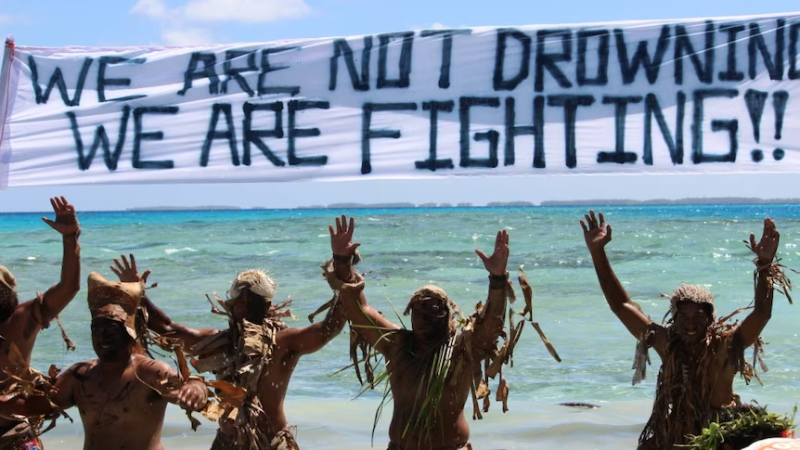The recently announced deal to send hundreds of refugees to Nauru raises serious questions about human rights and environmental obligations. Alison Battisson and Janet Pelly explain.
The Nauru deal was triggered by a 2023 High Court judgment, which said the government cannot constitutionally punish a non-citizen by indefinitely detaining them. The judgment affirmed that non-citizens, just like citizens, are protected from arbitrary interference with their liberty.
The primary and immediate impact was the release of individuals from immigration detention who could no longer be legally detained. But the ruling did not create a specific visa or pathway to permanency for stateless people, and the Government has since explored other solutions to the quandary of refugees with nowhere to go.
Enter the Nauru ‘solution’
Pay to deport. Australia’s shameful return of penal colonies
Nauru – the world’s smallest island state
Nauru’s population of 12,000 lives on the coastal fringes of land smaller than Melbourne airport (21-sq km). DFAT notes, “the country is already facing challenges such as stronger and longer-lasting droughts, heat waves, coastal erosion, increased acidity of ocean waters, sea level rise, wind-driven waves and king tides. These climate-related hazards are projected to intensify over time.”
In response, Nauru has embarked on a nation-building project that would test a superpower. Its Higher Ground Initiative, launched in 2021, aims to relocate 90% of the population inland over 50 years—rebuilding homes, schools, hospitals and essential infrastructure from the ground up.
Nauru’s existential challenge echoes a wider regional struggle. In 2019, law students formed Pacific Island Students Fighting Climate Change (PISFCC). With support from the Government of Vanuatu, they led a global campaign urging the world’s highest court to clarify states’ legal obligations on climate change.
ICJ ruling
In November 2024, the full 15-member bench of the International Court of Justice (ICJ) addressed two fundamental questions across the full scope of international law, including the UN Charter, relevant climate and environmental treaties, and human rights law:
- What are states’ obligations under international law to address climate change for present and future generations?
- What are the legal consequences under these obligations for states failing to act?
It heard over 150 submissions, including Nauru’s, which emphasised that it is a specially affected state under international law due to climate-related threats to its habitability, food security and territorial integrity. Its submission noted that the ICJ has,
the opportunity to reaffirm that the rule of law protects the weak against the excesses of the powerful.
Seven months later (on 23 July 2025), the ICJ delivered its unanimous decision that states do have binding obligations to protect people from climate harm.
An ethical bind
The ICJ’s ruling intersects with the 2023 High Court ruling, and the hundreds who were released from indefinite administrative detention, sparking a political firestorm.
In response, Parliament pushed through rapid amendments to the Migration Act 1958 (Cth). These imposed ankle bracelets, curfews, movement restrictions, threats of preventive detention, and even proposed jail terms for non-cooperation. The Home Affairs Minister justified it as necessary to keep Australians safe’.
However, community safety concerns didn’t stop the $2.5billion deal that will see Nauru take hundreds of Australia’s exiles on 30-year visas.
Likely sensing the potential for legal challenge, Parliament rushed through the Home Affairs Legislation Amendment (2025 Measures No. 1) Bill 2025 days after the deal was announced (1 September 2025). It declared, “the rules of natural justice do not apply in relation to third-country reception arrangements with a foreign country.”
This means people can now be raided, detained and removed offshore without notice, regardless of family ties, the risks they may face in the receiving country and with limited information on health conditions.
The Australian community is expected not to care because “they” have been presented to us as ‘foreign criminals’ – this is despite many having been raised in Australia, some with minor or no convictions and others who have not re-offended after decades. Crucially, the amendments don’t just apply to this first group—they cover up to 80,000 people, making this cohort a test case.
Nauru deal consequences
What does this mean in practical terms? A few things:
- Nauru’s population will increase while it struggles to adapt to climate change. This defies logic, even if the deal bankrolls adaptation measures.
- Unemployment is already high, so this group is unlikely to find work and contribute economically.
- President David Adeang has been quoted as saying they have served their time and are no longer subject to punishment, but Nauruans have been listening to the inflammatory rhetoric of Australian politicians and forming different opinions, including,
Government is so out of touch, turning this country into a sanctuary for illegals and criminals.
Beyond that, it’s hard to comment on the deal because the Memorandum of Understanding, signed on 29 August 2025, remains secret.
What we do know is that Nauru will offer 30-year visas but no right of family reunification or citizenship. There are claims that certain rights will be protected, but no details as to how. If Nauru wants to deport (including to countries of origin), the only safeguard is that Australia must be consulted first.
This begs a stream of questions, including:
- What social and environmental impact assessments were done?
- What are the minimum human rights guarantees for these paid (‘third country reception’) arrangements?
- Without the prospect of citizenship, what rights or protections will be afforded to Australia’s deportees?
- What is the impact on families who are permanently unable to reunite?
Ethics and accountability
The Australian government claims its offshore policy is lawful, but outsourcing people does not erase responsibility. If our government funds, designs, and controls a policy—even indirectly—liability persists.
International law is clear that states cannot avoid accountability by shifting harmful practices beyond their borders. By affirming that human rights and environmental obligations extend extraterritorially, the ICJ has confirmed that duty of care follows the people a country displaces.
It’s important to note that legislating natural justice out of the equation does not erase Australia’s duty of care.
Additionally, the legislation takes in as many as 80,000 people , raising the question of whether Australia will enter into deals with other climate-vulnerable nations.
Australia speaks of a shared Pacific future and has contributed to a range of climate adaptation initiatives.
However, by paying a climate-threatened nation to take people it calls ‘violent’ and ‘appalling’, the Australian government ventures into murky territory and potentially destabilises an important relationship and region.
The question now is whether we will continue to export our legal and political problems—or rise to the challenge of meeting our responsibilities, regionally and at home.
Asylum seekers’ frustration mounts, pressure on Australia to act.


